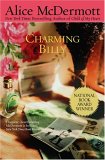Summary | Excerpt | Reading Guide | Reviews | Readalikes | Genres & Themes | Author Bio

My father sat to her right. Although Maeve had made all the arrangements herself--had found the place and chosen the menu and requested the fruit salad he served as soon as all the guests had arrived so there would be no long interval for speeches or toasts, only a quick blessing from one of the priests, he was the one the waitresses spoke to, and the owner of the place asked every now and then if anything was needed. He was the one who would settle the bill at the end of the afternoon and tip the waiters and the girl who took the coats and the umbrellas. He was the one who asked Maeve, after he'd already poured her a glass of iced tea, if she would like a drink, and then got up to fetch it for her, nodding to the undertaker and the driver, who were having their lunch at the bar.
She said, "Thank you, Dennis," when he placed the martini in front of her and then waited just a moment, her pale hand just touching the stem of the glass before she lifted it. "Good luck," he said, raising his own glass of beer. She nodded.
There's not much sense in pointing out the irony here--or even in trying to determine if everyone was either oblivious to it or so keenly aware that it no longer bore mentioning. Billy had died an alcoholic. Last night, in his casket, his face was bloated to twice its size and his skin was dark brown. (Dennis himself, my father, when he had identified the body two days ago at the VA, had said at first, momentarily relieved from the fact that Billy was dead, "But this is a colored man.")
Billy had drunk himself to death. He had, at some point, ripped apart, plowed through as alcoholics tend to do, the great, deep, tightly woven fabric of affection that was some part of the emotional life, the life of love, of everyone in the room.
Everyone loved him. It was Mickey Quinn saying this, down at my end of the table. Mickey Quinn, who also worked for Con Ed, his territory being here in the Bronx, although he'd never heard of this place before. Mickey with a beer in his hand, and the irony either lost on him or too obvious even to bear mentioning. "If you knew Billy at all," he said, "then you loved him. He was just that type of guy."
And if you loved him, we all knew, you pleaded with him at some point. Or you drove him to AA, waited outside the church till the meeting was over, and drove him home again. Or you advanced him whatever you could afford so he could travel to Ireland to take the pledge. If you loved him, you took his car keys away, took his incoherent phone calls after midnight. You banished him from your house until he could show up sober. You saw the bloodied scraps of flesh he coughed up into his drinks. If you loved him, then you told him at some point that he was killing himself and felt the way his indifference ripped through your affection. You left work early to identify his body at the VA, and instead of being grateful that the ordeal was at long last over, you felt a momentary surge of joy as you turned away: This was not Billy, it was some colored man.
"He had the sweetest nature," another cousin, yet another Rosemary, said at my end of the table. "He found a way like everyone, he really did. He always found something good to say, or something funny. I He could always get you laughing."
"He was funny, though." It was agreed. "God, wasn't he funny?"
"Everyone loved him."
Not missing the irony of the drinks in their hands and the drink that had killed him, but redeeming, perhaps, the pleasure of a drink or two, on a sad, wet afternoon, in the company of old friends, from the miserable thing that a drink had become in his life. Redeeming the affection they had felt for him, once torn apart by this willfulness, his indifference, making something worthwhile of it, something valuable that had been well spent, after all.
The fruit salad was canned but served with a little scoop of lime sherbet, which was refreshing, everyone agreed. It cleared the palate. "The rolls were nice. There was some soda bread in one of the bread baskets, someone must have brought it. "Not as good as mine, but then I prefer it with caraway seeds, the way my mother used to make it..."
From Charming Billy, by Alice McDermott. © 1997 by Alice McDermott, used by permission of the publisher Farrar Stead & Giroux
Your guide toexceptional books
BookBrowse seeks out and recommends the best in contemporary fiction and nonfiction—books that not only engage and entertain but also deepen our understanding of ourselves and the world around us.